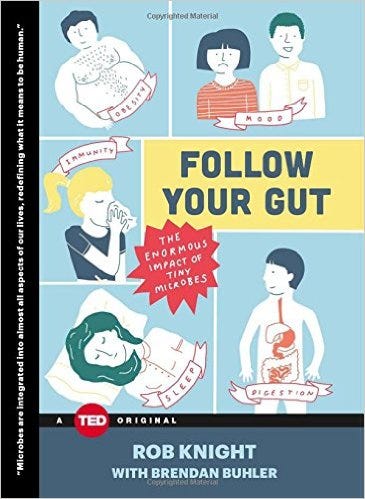Learn how important our gut is to our health and brain

It is estimated that our body contains about 100 trillion microbial cells. In this book, you will learn the important role those microbes have on our health.
The human microbiome
The human microbiota is the collection of single-cell organisms living in the human body. A high concentration of them lives in the digestive system where they realize important work like helping us absorb nutrients, while other microbes live on our skin, where they build a unique “microbial fingerprint.”
Humans share about 99.99% of the same DNA, but we share only 10% of the genes of microbes in our gut. The genes of those bacteria are called the human microbiome.
The microbes a baby gets from natural birth may play an important role
While a child is in its mother’s womb, it’s body is free from microbes, although it depends on the mother’s microbes to get nutrients. But once the baby passes through the birth canal, a number of bacterias such as lactobacilli are transferred to it.
Caesarean sections are used to prevent eventual birth complications, but they also result in the baby not getting the microbes of its mother birth canal.
A possible solution is to transfer those microbes later using sterile cotton swabs.
Microbes might have an influence on weight and anxiety
There have been a number of mice experiments which found that their gut bacteria determine weight, can influence their anxiety, and even reverse symptoms of cognitive problems. That connection between the gut and brain is called microbiome-gut-brain axis. People with depression often experience inflammation in the bowels, which leads oscillibacter bacterias to produce natural tranquilizers such as gamma-Aminobutyric acid, which act to calm the brain, but can also cause depression.
Prebiotics and Probiotics
The importance microbes play in our health, lead the industry to produce probiotics such as natural yogurt. While not approved by the FDA, there are studies which found that probiotics can be helpful for children with diarrhea and adults with irritable bowel syndrome.
It is likely however that the bacterias contained in probiotics are already in your gut. Therefore you can just feed them with their favorite food. Food bacterias love to eat is called prebiotics. They consist of dietary fibers such as inulin or lactulose or galacto-oligosaccharides.
Our ancestors had a diet rich in fiber, unfortunately, something our modern diet lacks. Adding more fiber to your diet could, therefore, be beneficial.
Antibiotics harm beneficial microbes and lead to antibiotic resistance
Antibiotics can cure bacterial diseases. Unfortunately, they don’t differentiate between good and bad bacterias and thus also kill the good bacterias.
Studies have shown that antibiotic treatment within the first six months of a person’s life can disrupt the development of Bifidobacterium which plays an important role for our immune system. This can lead to the development of abnormal weight gain, asthma and allergies later in life.
